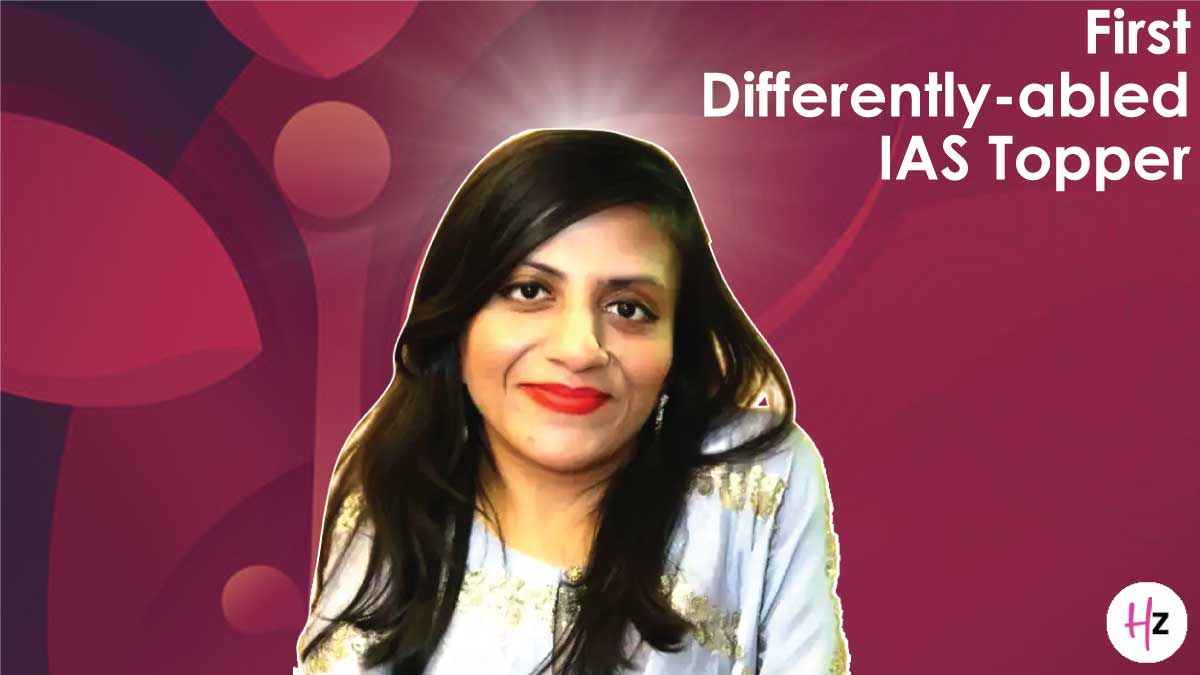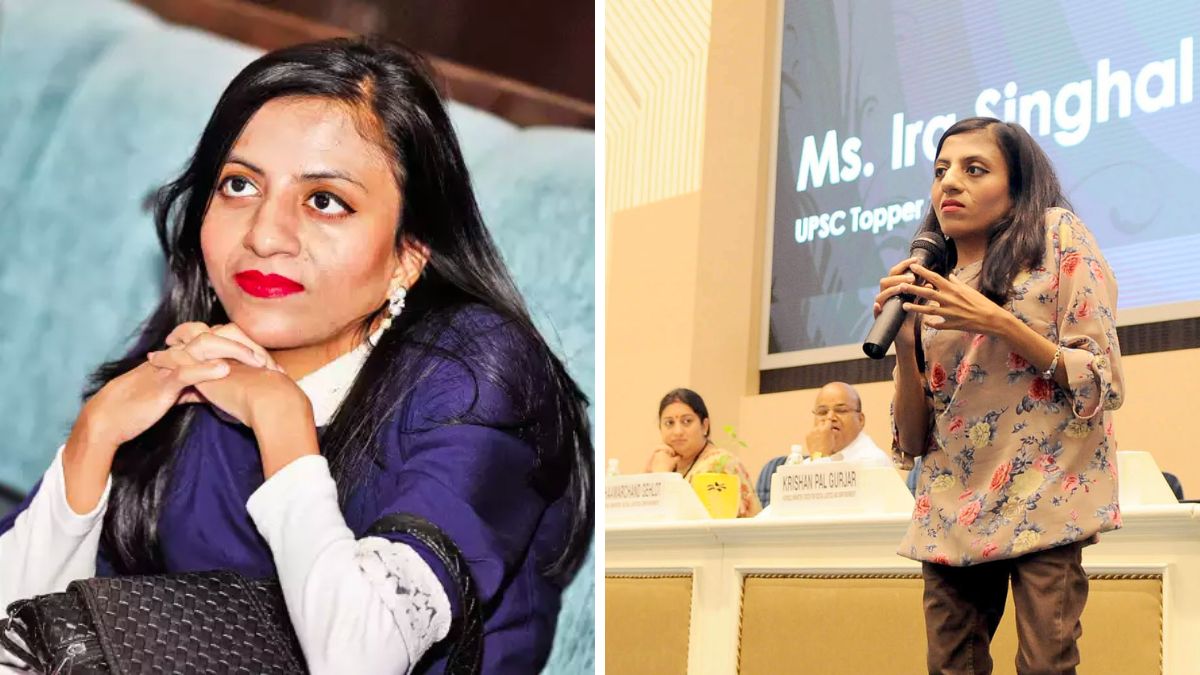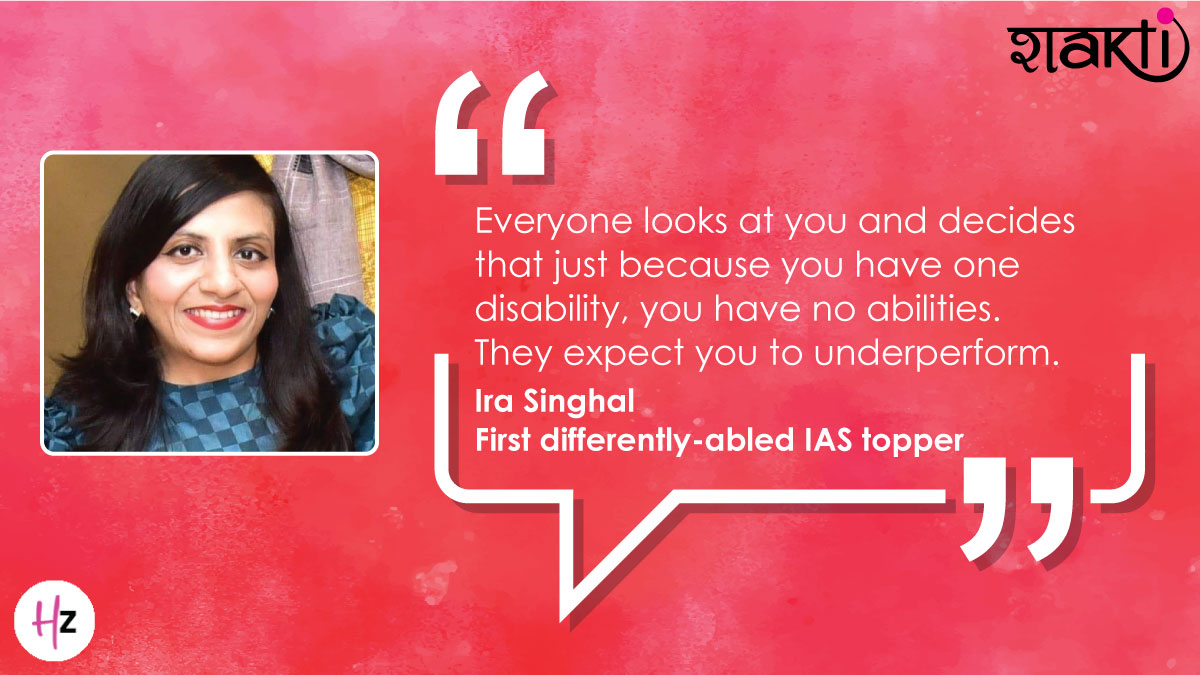
Ira Singhal was in her twenties when she cleared the UPSC examination on her first attempt. However, despite securing a rank good enough to be allotted an IRS position, she wasn’t given one.
“I qualified for all the ‘abilities’ the job needed and was listed, yet I didn’t get it,” said Singhal, who is in her forties now. “They only focused on my disability, and it almost implied that they didn’t like my disability so they didn’t want me to get a role,” she added.
Ira has scoliosis, a spine-related disorder, which disrupts her arm movement. She cleared the examination twice more, only to face the same disappointment. In 2014, she was the first person with disabilities to hold rank one in the UPSC examination, on her fourth attempt.
From an early age, Ira was sure she wanted to help make society better, and while growing up, she aspired to become a doctor. However, she ended up studying engineering and then doing an MBA.
“While I was working in the corporate sector, I realised, all the work that I’m doing, really makes no difference to anyone,” said Ira, adding,“There’s nobody who looks at this and thinks ‘oh, my life is better because you worked so hard.’”
The desire to create a real impact is what pushed Ira to try getting into the Indian Civil Services. “I truly believe that if the government does its job well, there won’t be a need for a social sector separately,” she said.
When she was around age 27, she sat for the UPSC examination for the first time.
Ira cleared the UPSC examination on her first attempt and was eligible for a role in the IRS (Indian Revenue Services).
“People with disabilities are forced into appearing under the disability quota, and under that, there are two things, what is your disability and what are the abilities required for the role,” explained Ira. “The problem is that there is no correlation between the two,” she said.
People with disabilities were only allowed to work as IAS, and none of the other services were willing to take her in, despite her fulfilling all the abilities required for the role. Ira then chose to fight a legal battle, questioning this prevailing practice.
“I realised I had the financial bandwidth, so I decided to fight this,” she said. “I was fighting for an allotment in the IRS, based on my rank. It had seemed like they had rejected me, just because they didn’t like my disability,” she further said.
It took her about four long years to win the battle. By then, she had cleared the UPSC twice again, only to have faced the same fate. They were yet to give her a joining when she appeared for the examination again.
In 2014, on her fourth attempt, she topped the examination, becoming the first ever differently-abled person to top the IAS examination.
View this post on Instagram
“In my head, it was just relief. It was over, finally,” she said. “This examination is like self-inflicted torture,” Ira added.
Ira, now 40, works in Arunachal Pradesh as the Special Secretary of Education.
While describing the biggest pitfalls of the process, Ira says it's just people’s prejudices and biases.
“They look at you and decide that just because you have one disability, you have no abilities. They expect you to underperform,” she said. She further said, “This is the case with all people with disabilities. The world constantly rejects you, without giving you an opportunity to prove yourself.”
 However, Ira does add that there has been a shift over the last seven or eight years, with organisations, corporates and offices becoming more and more disability-friendly.
However, Ira does add that there has been a shift over the last seven or eight years, with organisations, corporates and offices becoming more and more disability-friendly.
She says that giving up had been an option, right from childhood, but she had to brave through.
“Schools constantly tell you that they cannot take you. You may have no special requirements, which most people with ortho-disabilities would not have, but you’re still not accepted,” she highlighted. “Right from day 1, you are used to that rejection and judgement. So if I hadn’t given up then, I wouldn’t give up later,” Ira added.
The only way she says she would give up, was if she didn’t clear the examination. “Then I’d know that I didn’t have the capacity for the role, but I wouldn’t give up due to other people’s prejudices. That’s their problem, not mine,” said Ira. “.”
Ira highlights that without parental support, you cannot do much in life, especially as a child with disabilities. “That is your backbone, that is your basic strength,” she said adding, “Even the idea of what you’re capable of doing will come from family.”
“My one message to parents of kids with disabilities is that if you don’t think and dream for your child, nobody else will,” she said. “Look at your child’s abilities. You have you believe in your child’s abilities. It becomes your responsibility that your child is treated with dignity and respect and can become a person contributing to society,” she further said.
View this post on Instagram
In every professional role Ira played, she’s taken many initiatives to fix the gaps that exist. “Recently in Arunachal, I started mental health workshops in the school curriculum. I standardised classroom teaching, started career counselling, and sensitisation around disabilities and gender,” she added.
Being someone who looks at the situation as the ‘glass half full’, Ira is excited about wherever her job takes her and knows in her heart that she’ll find ways to make a difference.
Also watch this video
Herzindagi video
Our aim is to provide accurate, safe and expert verified information through our articles and social media handles. The remedies, advice and tips mentioned here are for general information only. Please consult your expert before trying any kind of health, beauty, life hacks or astrology related tips. For any feedback or complaint, contact us at [email protected].